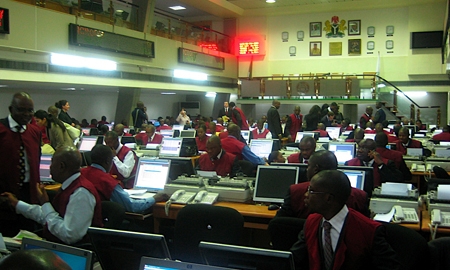The Nigerian Stock Exchange (NSE) has been one of the top performers, with its All Share Index climbing 26.7 per cent from the beginning of the year through November 22.
Founded in 1960 as the Lagos Stock Exchange, the NSE has grown from its initial listing of 19 companies to trading shares of about 200 companies today. The exchange has a typical trading volume of more than 150 million shares per day, and a market capitalisation of more than 8 trillion Nigerian naira (£31.3 billion).
The exchange has grown to include 13 branch offices spread throughout the country in its major cities. The 14 offices share an Automated Trading System, which has been in operation since 1999, that permits dealers in any of the offices to execute trades with dealers in any of the other offices.
The companies listed on the exchange represent a broad range of sectors, and include Nigerian and foreign businesses. The NSE also has a market in exchange-traded funds (ETFs), which bundle together shares to permit investors to buy units in the fund and in that way track the performance of a specific index.
The NSE plans to roll out a new bond-trading platform in 2013 that aims to provide retail investors with access to a secondary market in NSE-listed debt instruments. The goal is to provide an efficient and transparent service that will promote trading in the Nigerian debt market.
Foreign investors dominate trading at the NSE, representing about 70 per cent of participation. That figure has declined from 80 per cent before the world economic crisis in 2008-2009, indicating increased local interest in the investment opportunities provided by the exchange.
The Nigerian government has been very active in promoting foreign investment in the NSE, abolishing laws that impeded the entry of foreign capital, and permitting brokers from other countries to carry out trades locally. Investors from any country are free to buy and sell shares on the NSE, and Nigerian companies are also allowed to list their shares on foreign markets.
As part of its efforts to make the NSE more attractive to local and foreign investors alike, the exchange’s management recently started a market-makers programme that will ensure liquid trading in shares that are part scheme. Ten brokers at the exchange provide two-way quotes on the shares of 28 traded companies, thus making sure that buyers and sellers of those shares can find counterparties for their trades.
The NSE is actively promoting Nigerian investment opportunities in other parts of the world as well. During the 2012 Olympics in London, the exchange, along with 15 listed companies and several market operators, participated in the African and Caribbean 2012 Business Expo, a forum that brought together news media, business leaders and senior government officials from a host of countries.

0 COMMENTS